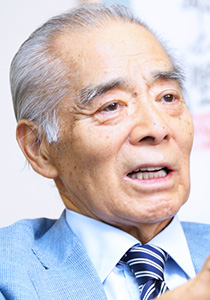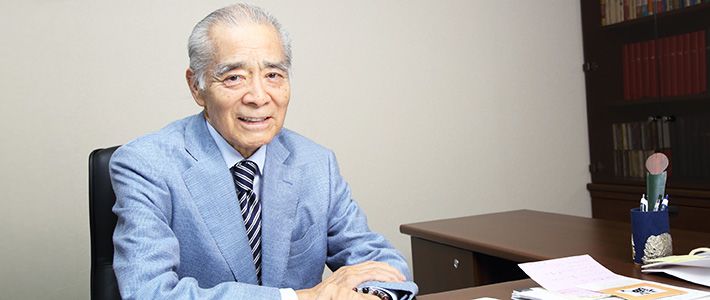
Japan’s Role in a Changing World
Economy Society Culture- English
- 日本語
- 简体字
- 繁體字
- Français
- Español
- العربية
- Русский
A Changing Global Order
INTERVIEWER The leadership of the United States within the international community has declined, relatively speaking, while the ranks of the key countries that will determine the future direction of the world have expanded beyond the G8 to the G20, which includes newly industrialized countries. What are your thoughts on this global trend?
KOBAYASHI YŌTARŌ My impression from global events, including the recent move by Russia to incorporate Crimea into its territory, is that dark clouds are on the horizon with respect to the longstanding power of the United States. Meanwhile, China has been gaining strength for some time now. I had even thought at one point that we might be entering the era of the “G2”—with the United States and China as the two superpowers. But I ended up miscalculating because, to be frank, the Obama Administration has failed to live up to expectations, despite the idealistic slogans it raised when it took over from the Bush Administration.
The Americans themselves must have anticipated the relative decline of their nation’s power. But you wouldn’t know that fact from speeches President Barack Obama has given recently. He has not been up to the challenges and changes of the world today, perhaps due to a lack of personal leadership skills, and that seems to be why the country finds itself in its current situation.
Coupled with the decline of the United States, there has been the steady rise in power of China and Russia. They are able to create a fait accompli and then not back down. The heads of those two states, Xi Jingping and Vladimir Putin, have perceived the weaknesses of the United States. Knowing that the United States and European Union countries are not always on the same page with regard to the Ukraine and Crimea issue, President Putin has managed, as one scholar put it, to remain at least one or two moves ahead of President Obama—and that is my impression, too. It puts Japan in an awkward position.
Today Executives Face an Even Greater Challenge
INTERVIEWER For close to 50 years now you have served as an executive at one of the leading foreign-affiliated companies in Japan. What are your thoughts in looking back on the decades spent at Fuji-Xerox?
KOBAYASHI If you compare the situation today to that of the 1980s and 1990s, when my generation was entering the ranks of top management, you’ll find that things are quite different, such as the sorts of management tools that are used. Back in those days, an executive had to weigh each decision very carefully, examining every point before deciding to move ahead with an initiative. That was the procedure that executives had to follow. But these days, with all sorts of information available instantaneously, no one has the luxury to spend so much time pondering a situation. Looking back on the history of Fuji Xerox, which was formed as a joint venture between Fuji Photo Film and Xerox, you can see that in those early years of the company, in the 1960s and 1970s, there was a strong bond of trust between the executives from both companies and a healthy sense of pride on each side. Xerox, for its part, wanted to develop a hub in Japan as a launching point for the growing Asian market, while Fuji Photo Film was eager to acquire innovative new photography-related technologies.
One of the challenges Fuji Xerox sought to undertake at the time was to raise the level of its manufacturing craftsmanship, with an eye to making products in a cost-efficient and timely way. Fuji Xerox was created in 1962, one year before I joined the company, but already our focus was to become a preeminent, outward-looking manufacturer. But our unflashy emphasis on manufacturing craftsmanship also had limitations that were revealed around the time of the 1974 “oil shock”—to the point where the future of the company itself was called into question.
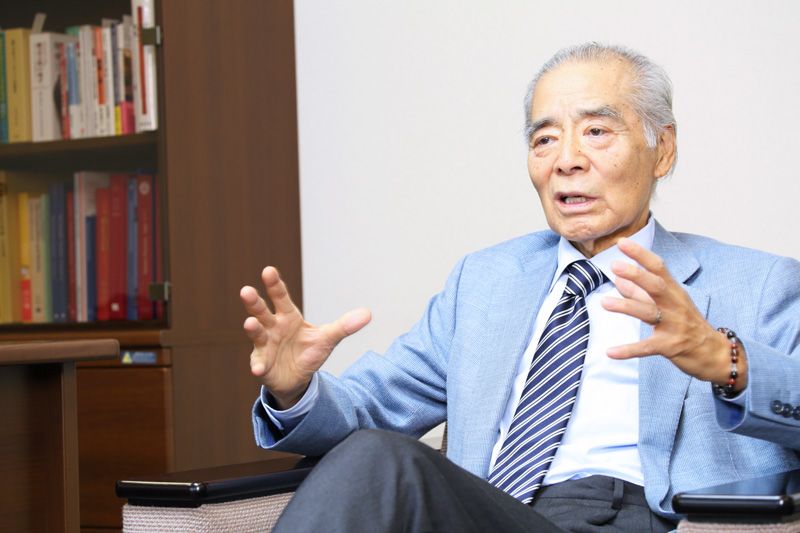 The other challenge for us was to learn from our counterparts at Xerox by studying what they were doing and listening to what they had to say. The new company Fuji Xerox gave us the freedom to do this. Since Fuji Xerox was staffed by people hired initially by separate organizations, there were a lot of hurdles to overcome. This meant that from the 1970s all the way to the time I stepped down as president in 1992, a major task for us was to forge our own distinctive corporate culture. We managed, in the end, to be a pioneer in such fields as IT and computerization, but I still regret those cases where we had the chance to boldly open up a new field but did not pull it off. Be that as it may, I would say that the situation facing executives today is much more difficult than in those early days.
The other challenge for us was to learn from our counterparts at Xerox by studying what they were doing and listening to what they had to say. The new company Fuji Xerox gave us the freedom to do this. Since Fuji Xerox was staffed by people hired initially by separate organizations, there were a lot of hurdles to overcome. This meant that from the 1970s all the way to the time I stepped down as president in 1992, a major task for us was to forge our own distinctive corporate culture. We managed, in the end, to be a pioneer in such fields as IT and computerization, but I still regret those cases where we had the chance to boldly open up a new field but did not pull it off. Be that as it may, I would say that the situation facing executives today is much more difficult than in those early days.
Mutual Trust Emerged from Trade Friction
INTERVIEWER You have held a number of key international posts, such as serving as the chairman of the Japan Association of Corporate Executives, the Japanese chair at the Japan-US Business Council, and the Asia Pacific chairman of the Trilateral Commission. In the period from the 1970s to 1990s there was considerable economic friction between Japan and the United States. Even though it has subsided since then, my impression is that the personal relations and contacts between the two sides have atrophied somewhat.
KOBAYASHI One thing that is very clear is that, compared to their forerunners, the younger generation of executives are far more likely to hold MBAs, have overseas experience, and be able to speak foreign languages. So it is a bit puzzling that, despite those improvements, they are not in particularly close contact with their overseas counterparts in financial and business circles. It may seem somewhat ironic, but all of those noisy disputes in the past between Japan and the United States over specific issues in the automotive, film, insurance, and other industries ended up serving, in a certain sense, as a way of building bonds of trust between the two sides. Today, even though there are still areas where the two sides are trying to solve issues together, there is not the same sense of focus.
Many of the issues that Japan and the United States need to address collectively are related to China. During my stint as the Japanese chair at the Japan-US Business Council, I sometimes suggested that we set aside our respective economic issues for a moment to focus on Asia and the problems involving China, but my American counterparts were not very keen on that idea. I don’t know exactly what the atmosphere is like these days within the Business Council, but I do think it is safe to say that there is not as much eagerness as before on both sides to ponder our common issues and try to come up with solutions and chart a future direction.
In mid-April the Aspen Institute Japan is holding a three-day meeting on rebuilding US-Asian ties. The US participants include Professor Michael Green and government officials, but relatively few from business circles. On the Japanese side, Hasegawa Yasuchika, president of Takeda Pharmaceutical and current chairman of the Japan Association of Corporate Executives, will be in attendance, but in recent years the membership of the Japan-US Business Council seems to have undergone a change, in the sense that there are now fewer representatives from the business world. Apparently, there is an assumption that business leaders should only think in terms of microeconomics, and leave the macroeconomic topics to others. I think the business leaders have been influenced by the criticism of those who think there are few practical reasons or tangible benefits for an executive to attend a global conference.
Surprisingly Little Concern About Deficits
INTERVIEWER Japan has been a country dedicated to manufacturing and export industries, but recently China has surpassed it in terms of GDP, amidst our worsening current-account balance caused by a growing trade deficit. Could you share your thoughts on the current situation for Japanese corporations?
KOBAYASHI Now that a trade deficit has become the norm in Japan, some have been saying that there is no particular need to worry about it. This is, in other words, the view that things are fine as long as direct overseas investment is increasing steadily and there is a return on that investment. There is also the question of where the root cause of the trade deficit lies, but that is seen as a complex issue that is probably better to not worry about. At the International University of Japan [in Niigata Prefecture], where I serve as chairman, this topic has been dealt with in discussions addressing the strategic issue of what Japan’s focus should be in the future in terms of its export-oriented products and industries.
Up to now, exports have been an avenue where Japan displayed its strength, so it is necessary to become aware of the factors that have been draining that strength. Yet, despite that need, there has been a surprising lack of concern about Japan’s swelling trade deficit in macroeconomic terms.
Remembering the Fundamentals
INTERVIEWER The international competitiveness of Japan’s electronics and home-appliance industry, which had been the country’s pride and joy, has also been slipping. Sony, for instance, for whom you once served as an outside director, is no longer the top company in its industry and has consistently posted losses in recent years. What does Japan need to do to regain the position it once held as a manufacturing giant?
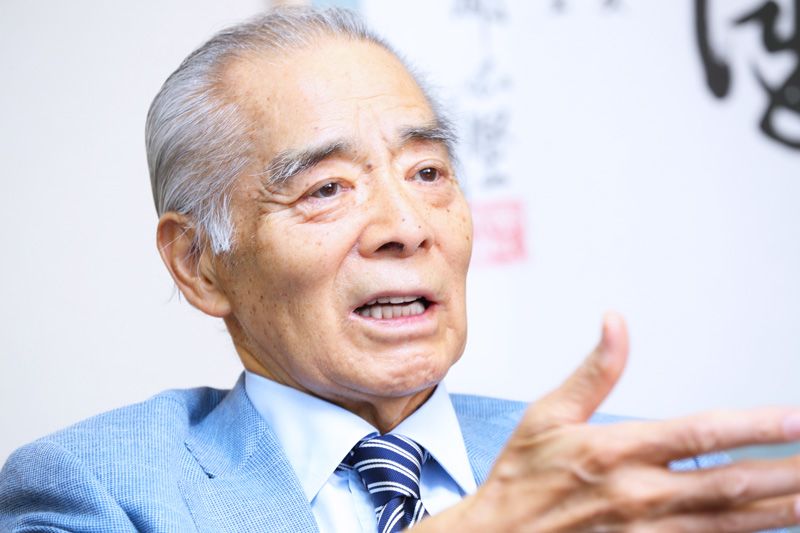 KOBAYASHI If you look at the manufacturers who have continued to generate profits, like Toyota or Komatsu, you’ll find that they have returned to the fundamentals and adopted a rational approach, always carefully considering why and when actions need to be taken. This is the result, I think, of not forfeiting their own corporate culture. When it comes to passing down that culture, it’s important to frequently convey to younger employees what has sustained the company up to that point—such as a commitment to manufacturing craftsmanship, for example.
KOBAYASHI If you look at the manufacturers who have continued to generate profits, like Toyota or Komatsu, you’ll find that they have returned to the fundamentals and adopted a rational approach, always carefully considering why and when actions need to be taken. This is the result, I think, of not forfeiting their own corporate culture. When it comes to passing down that culture, it’s important to frequently convey to younger employees what has sustained the company up to that point—such as a commitment to manufacturing craftsmanship, for example.
Where Sony Went Astray
With regard to Sony, my impression is that the company began to feel limited by the approach that had taken it to the top of the electronics industry; an approach where the company always sought to improve its existing products, such as televisions. Its corporate culture began to prioritize making different products, rather than thinking in terms of improvements. In other words, the company did not seem to find motivation in the task of taking a product type that already existed and making it a bit better.
When it comes to making something different, a company needs to inject new investment. In contrast, existing capital can be used to make products better. Granted, it is also necessary for a company to produce distinctive new products, but if you only pursue that goal there is less chance for success, in business terms. So it is necessary for a company to also consider how to continue improving its existing products that form the basis for company revenue. The only option is to keep at this unglamorous, practical-minded task.
Having said that, I think that Sony will make a comeback—although I’m not sure whether it will revive itself as an electronics firm or not.
INTERVIEWER The growth strategy dubbed “Abenomics” has yet to be fully implemented. We’ve seen some positive factors that are lifting results for export-driven industries, such as the weaker yen and the rise in the stock market, but this has been coupled with negative fallout from the weaker yen, too. What is your view of Japan’s economic recovery?
KOBAYASHI Even though the first two arrows, monetary relaxation and application of fiscal stimulus, have worked relatively smoothly, it will not be easy to implement the so-called “third arrow” of Abenomics. As for Abenomics in general, we have seen that, despite the almost weekly fluctuations in the stock market, companies of a certain scale have been showing good results and increasing base pay for their employees. But there is a gap between those companies and other firms. My biggest concern at the moment is the impact of the recent rise in the consumption tax now that the surge in demand that preceded the increase has died out. I wonder how much trust the Japanese people have in the government’s policies to address this problem.
The Cabinet of Prime Minister Abe Shinzō still enjoys a relatively high approval rate, but I think he needs to be concerned about public trust in the wake of such issues as the manner in which he won Diet approval for the State Secrets Protection Law. We have seen a number of cases up to now where the LDP government relied on its overwhelming majority in the Diet to push through legislation. In these cases there has not been adequate debate—although the opposition also bears some of the blame for this. I think that the Abe government deserves a great deal of praise, particularly for its efforts on the foreign-policy front, but I hope that it will not lose the trust of the people as the result of how it is dealing with some issues, such as the question of collective self-defense.
Improving Ties with China and South Korea
INTERVIEWER In your role as a corporate executive you have sought to improve relations between Japan and China. And this has also been a task for the government of Prime Minister Abe. What is your take on the current state of relations with China and South Korea?
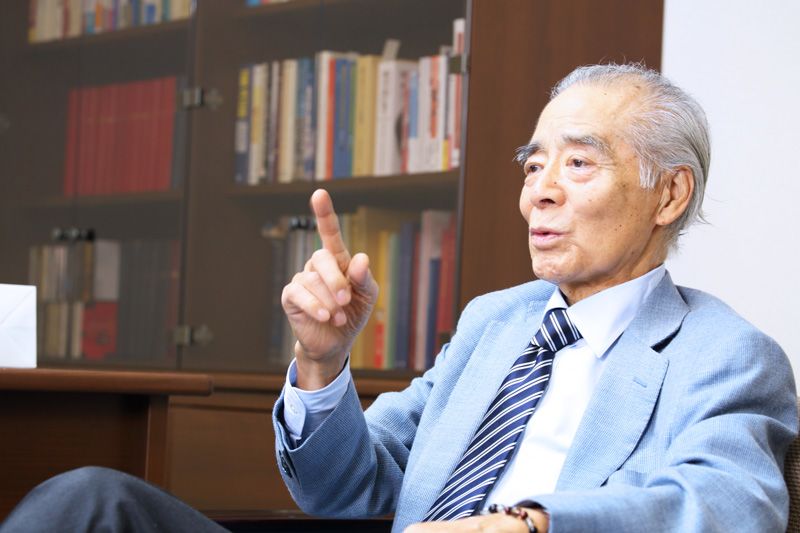 KOBAYASHI It’s hard to say which is in a worse state at the moment—Japan’s relations with China or its relations with South Korea. If historical issues become the focus of too much attention on each side, then it becomes much harder to find solutions. I wish that South Korea and China would also take a more realistic or flexible approach. It is true that there are things that your average Japanese person was not taught by the postwar public school system, but there aren’t that many Japanese who are completely ignorant of the historical facts. What has vexed the Chinese is not the outlook of the Japanese public but the statements of its politicians. Despite that situation, my impression is that both sides are gradually making efforts to mend ties—although Japan-China relations won’t be improved overnight.
KOBAYASHI It’s hard to say which is in a worse state at the moment—Japan’s relations with China or its relations with South Korea. If historical issues become the focus of too much attention on each side, then it becomes much harder to find solutions. I wish that South Korea and China would also take a more realistic or flexible approach. It is true that there are things that your average Japanese person was not taught by the postwar public school system, but there aren’t that many Japanese who are completely ignorant of the historical facts. What has vexed the Chinese is not the outlook of the Japanese public but the statements of its politicians. Despite that situation, my impression is that both sides are gradually making efforts to mend ties—although Japan-China relations won’t be improved overnight.
INTERVIEWER The corporate philosophy you advocated in leading Fuji Xerox emphasized the importance of fostering mutual trust. Could you share some of your views regarding the sort of management principles companies should espouse and what kinds of strategies they should adopt in terms of CSR and the like?
KOBAYASHI Working is very important for people because it is connected to a sense of personal dignity. Everything has become much more convenient in the new IT era, but the work of human beings remains central to the task of making things better, in a more cost-effective way. The mainstream approach today is to try to make products with the maximum of added value, using as few workers as possible, but I have doubts about this sort of management style.
The other day I was talking to an executive who had been tasked with streamlining his company. When I asked him whether the effort had paid off, he told me, quite frankly, that he wasn’t sure if the reform undertaken really had been the right thing to do. For a company to run on all cylinders, it’s necessary for management and the employees to have a sense of unity. It is also important for a company, in terms of how it will be viewed in the marketplace, to take a multifaceted view of its overall organization, rather than being swayed by a desire for short-term profits. Balance and integrity of management, this is the key.
(English translation of an interview in Japanese conducted on March 25, 2014, at the campus of International University of Japan in Tokyo by Harano Jōji, representative director of the Nippon Communications Foundation; photographs by Hanai Tomoko.)
Japan-China relations deficit Fuji Xerox Kobayashi Yōtarō Fuji Photo Film Aspen Institute Japan Japan-US Business Council
